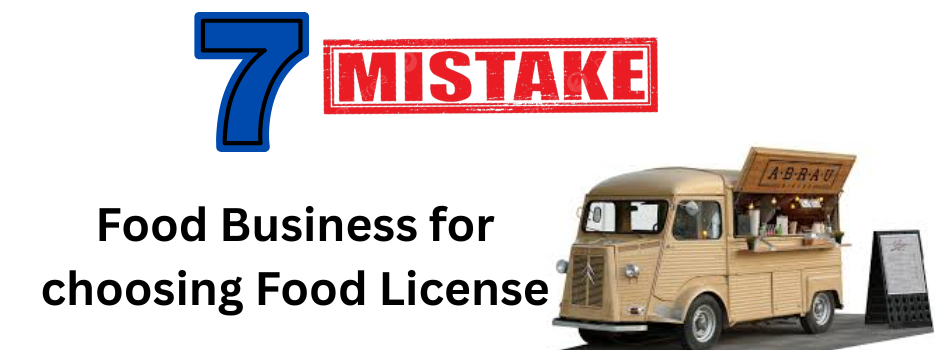The food business operators are experiencing a significant transformation. The driving and the cutting-edge transformation in the food business sector is changing the views and the preferences of the consumers. To analyze the major growth of the food business, the government of India is further focusing on and introducing various new schemes and rules. The other factors that enhance the food business are booming online food delivery and the adoption of organic and natural food.
At the same time, the benefits and the growth are the major factors that are encouraging people to pursue a bright career in the food sector. However, the representative of the food business can enhance the marketability with an FSSAI food certificate. Let’s delve into this blog to know which seven mistakes should avoid while registering for the FSSAI food license.
What are the Common Mistakes to Avoid by the FBOs?
Looking for the wise advice to complete the FSSAI food registration, here are a few points that you should know:
1. Incorrect documentation

Gathering the correct documents for the FSSAI food registration is the primary step. The documentation is the basis for the fast process and further increases the chances of food FSSAI certificate approval. However, in some cases, various food business operators fail to submit the required documents.
The official portal of the governing body requires the attachment of the necessary documents, such as the address of the industry, including the FBO’s personal details (e.g., PAN card, Aadhar card, etc.). Well, the wrong document submission can cause the certificate rejection or delay it. Therefore, the owners who are operating either outdoors or indoors need to submit the required documents.
2. Selecting the wrong certificate type
Many food business operators are unfamiliar with the type of license. The Indian governing body introduces the various types of FSSAI licenses; the specifics depend on the food business environment. Due to the lack of knowledge regarding the types of food business certificates, uncertainty arises during the registration procedures.
Meanwhile, there are three types of licenses: state license, basic registration, and central license. If the FBO fails to register as per the business scale and nature, it will lead to the application delay or rejection. Choose the appropriate type of food certificate according to your business’s turnover.
- Basic registration: Under the Food Safety and Standards Act, 2006, it is a mark as a fundamental process to register with the Food Safety and Standards Authority of India. While the FBOs whose annual turnover is below Rs 12 lakh are negligible for basic FSSAI registration.
- State License: The food business operators who regulate the business with an annual turnover between Rs 12 lakhs and Rs 20 crore need to register for the FSSAI State License. The regulatory body issues the certificate, which is valid for only 5 years.
- Central License: The central FSSAI license is essential for food operators with an annual turnover of Rs 20 crore or more. In addition, the central certificate is also beneficial for those FBOs who are operating various businesses in multiple states or have multiple food restaurants or shops.
3. Online technical issues
The food applicant can face several digital issues during the registration process. Due to the technical issue, the server goes down and creates errors during the application submission. While the technical issues involve application payment failure, the error in the online portal, and many more.
The application submission may fail to connect with the database, leading to submission failure. In addition, the poor internet connection led to the delay of application form submission. Sitting in a place where the connection is near the device helps to decrease the technical issues.
4. Lack of knowledge of FSSAI

To begin any start-up, the operator first needs to gain knowledge in the same field. While, during the Food FSSAI certificate registration, the applicant deals with the mistakes. The lack of knowledge of FSSAI and its rules may lead to the selection error for the right license type. It further creates the filing of form issues and the submission of necessary documents.
Therefore, gain the knowledge of which type of food license is required. The business type and the turnover explain which type of certificate is required.
5. Fail to understand standard requirements
The governing body, FSSAI, has fixed certain criteria that are necessary to pass for all food business owners. However, in many cases, the FBOs may not comply with the required standards, which is crucial for a certain license type.
The standard body raises the concern about not meeting the specific criteria, which causes the FSSAI food certificate rejection or delay. Meet certain requirements, such as safety and quality standards, for the fast food registration approval.
6. Ignoring the renewal deadlines
A specific license is valid for a defined period. After that, the registration numbers expire and need for renewed. However, the food business owners can suffer late fees or even potential penalties if they fail to renew their FSSAI food license.
The operators who are regulating the food business focus on the renewal deadline and apply for the food license renewal before 21 days of its expiry. Through this, the FBOs can decrease the possible chances of late fees, including the penalty. In the food industry, renewing FSSAI registration is a legal requirement.
7. Not aware of food standard compliance
If the FBOs didn’t comply with the compliances, such as the proper packaging procedure, labeling, distribution, and many more, it would be marked as non-compliant with food standards. The offenses made by the FBOs are monitoring the business without a valid food FSSAI license or wrong use of the brand to engage consumers.
Overall, the new food business operators may now be aware of the compliance standards outlined in the Food and Safety Standards. Before applying for the food license, go through the legal compliance to protect the business from potential closure.
Conclusion – FBO Mistakes for Food License
By being aware of food and safety standards, providing the necessary documentation, and adhering to rules and regulations, food operators can reduce the likelihood of their certificates being denied or delayed. Without an FSSAI license, FBOs are not permitted to sell food in India.
FAQ | Clear your Doubts
- What is FBO in food safety?
In the sector of the food business sector, the Food Business Operators are mentioned as individuals or organizations who monitor the production, storage, manufacturing, or distribution of food.
- How can I check if my FSSAI license is real or fake?
To ensure the weather, your license is real or fake, visit the FSSAI’s FoSCoS website and check the unique number. The FBOs can check the validity of their license on the official portal.
- How can I apply for a food license?
To apply for a food license, the applicant needs to visit the FSSAI’s official portal. FoSCoS.
- Do you need a license to sell in India?
Yes, to sell or operate a food business in India, the operators are required to obtain an FSSAI registration. It is a mandatory procedure to protect the business from any legal risks.
- Can I get an FSSAI license in one day?
Yes, the FOBs can acquire the FSSAI food certificate in just one day. But to be eligible for this, the applicant must need to provide the correct documents.

